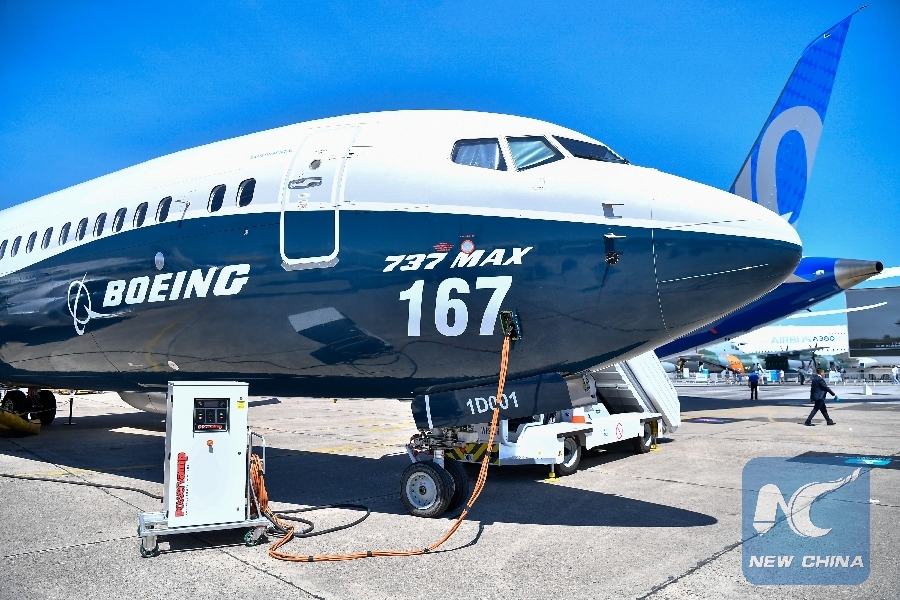
File photo taken on June 19, 2017 shows a Boeing 737 MAX 9 at the 52nd International Paris Air and Space Show in Bourget, France. (Xinhua/Chen Yichen)
WASHINGTON, March 16 (Xinhua) -- Aviation scientists have said the safety upgrade to software across the 737 MAX fleet is no easier than a plane redesign and it would take a while for pilots to regain their confidence of flying them after two crashes in less than six months.
Boeing said it is working with the U.S. Federal Aviation Administration (FAA) to develop the software enhancement, which the FAA hoped to mandate with an Airworthiness Directive no later than April.
It came after an aircraft of Ethiopian Airlines crashed on March 10, killing all 157 passengers and crew members on board a 737 MAX 8 plane.
Preliminary investigation showed that the track of the Ethiopian flight was very close and behaved very similarly to the Lion Air flight that crashed in October 2018 due to the automated software system called MCAS.
Eric Feron, professor of aerospace software engineering at the Georgia Institute of Technology, told Xinhua that there was a cross-compatibility problem with Boeing's willingness to make the 737 MAX 8 be "the same aircraft" as the previous 737 models, while improving its fuel consumption.
The geometric layout of the older 737 planes with narrow engines could fit snuggly under the wings as planned, but the wings of the 737 are too low to easily accommodate larger, more efficient engines in 737 MAX planes, according to Feron.
Boeing moved forward and up the new engines to prevent them from touching the ground, which changed the aircraft's aerodynamics, so engineers addressed it by changing control software to recover the same characteristics as the older model, to ensure the new model as "the same aircraft" to certification authorities, Feron said.
Feron said aircraft manufacturers and subcontractors were very averse to making big changes to existing flight software for fear of a complete new certification, but local changes to software, or adding a new piece of software, can have vast and hard-to-predict impact on the entire system, which made things "dicey."
However, solving hardware problems with software is okay but might be as difficult, and perhaps more difficult, than updating the hardware, said Feron. It can take as much money and time to fix a software issue as it is to fix a hardware issue, according to him.
Chien-tsung Lu, a professor of School of Aviation and Transportation Technology at Purdue University, doesn't think there is a mismatch between engine and fuselage for the 737 Max 8 as its structural dimensions have been improved to meet the best integrated aerodynamic design and performance.
But Lu is more concerned about Boeing's slow response to a potential software problem.
"If Boeing has perceived that the accident might be due to software problems according to archived pilot reports, it raises another question: Why Boeing did not take actions before the second B737 Max accident? What actually happened to Lion Air's crash?" Lu told Xinhua.
Some pilots had complained about unintended nose-down situations while flying the Max 8 jet, according to federal database.
Now, two black boxes of the crashed Ethiopian Airlines plane have been sent to Bureau of Enquiry and Analysis for Civil Aviation Safety of France for an investigation.
"The probable causes of the accident are still unknown. We must be patient and wait for the final accident report," said Lu, adding that "it would take a while for pilots to regain their confidence of flying Boeing 737 MAX."

